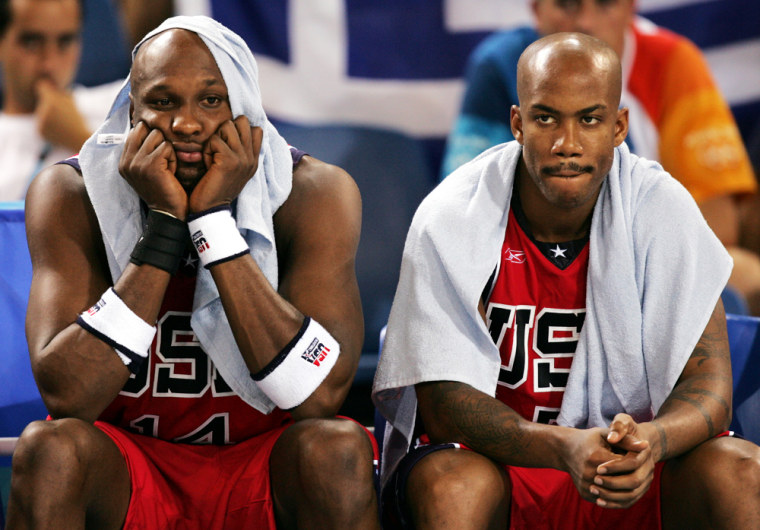Aaron Peirsol, an engaging, usually sensible American swimmer, accused a Japanese breaststroker of cheating teammate Brendan Hansen out of a gold medal Sunday night at the Olympic swim complex.
Kosuke Kitajima out-touching the hard-charging Hansen should not have happened, Peirsol said, because Kitajima employed something illegal called a dolphin kick as he began the 100-meter race.
"The whole stadium saw what happened at the start," Peirsol said. "Two-tenths of a second is what that was. It's Brendan's gold medal. There's nothing we can do about it. It breaks your heart, man. He knew what he was doing. It's cheating."
It should be noted that Kitajima held the world record in this event before Hansen bested it at the U.S. Olympic trials last month, and, coming from Japan, he happens to be too gracious and humble to lend credence to the controversy.
It should also be noted that Peirsol's accusation came on the night the U.S. men's 400-meter relay team felt it settled for a bronze medal. South Africa threw the swimming world into a tizzy, blowing past the Americans and the defending Olympic champion Australians, who finished sixth.
Did we mention Michael Phelps can no longer win eight gold medals? Or that across Athens, Puerto Rico spanked us so bad in men's basketball — the first Olympic loss for NBA players — that Larry Brown probably considered annexation at halftime? Beaten by the 51st state. The horror.
These are rough times in American sport, a time for introspection and contemplation.
Good, now that that's out of the way we can find comfort in a single notion: We didn't actually lose. We never lose.
No, after we didn't give it our best in the 400 free relay we had won in seven of eight prior Olympics, Eddie Reese, the U.S. coach, informed us that Ian Crocker, our leadoff man, had a sore throat for three days leading up to the race. Which helped explain why the team was dead last after 100 meters and why Phelps had to swim through water-ski chop to just close the gap to sixth.
In basketball, Brown, the coach who believes every other national team had 50 years to practice together as opposed to his team's two weeks, said, "I'm disappointed because I had a job to do as a coach, to get us to understand how we're supposed to play as a team and act as a team, and I don't think we did that."
It was not what Puerto Rico did to the United States to pull off one of the great upsets in international play, to send America to 109-3 in Olympic play; it's what Brown's players did to themselves.
See, the great thing about being a proud American at the Olympic Games is that other nations never actually beat us. No, we beat ourselves. Or, in the case of Peirsol's claim against Kitajima, the world cheated to prevent us from our birthright. We're Americans, dag-gum it. We win or go home. Or ask for a continuance.
We're the great sporting nation of Nike Chairman Phil Knight and his savvy marketers, who told the world on a Sydney billboard during the 2000 Games: "You Don't Win Silver. You Lose Gold."
Our best and brightest only triumph because, as softball gold medalist Lisa Fernandez said last week, "anything else would be a huge disappointment."
The gold-or-bust US of A, that's us.
Our athletes have beat up on the world for more than 100 years. Leading up to Athens, we had won 2,116 medals in the history of the Summer Olympics, almost four times more than Britain's questionable 638 and France's farcical 598. Japan had a measly 296 medals coming in. Don't they know who they were out-touching at the wall?
The Aussies ended America's unbeaten streak in the 400 free relay in 2000, winning for the first time since the event's inception in 1964. The feeling was that those arrogant blokes from America — Gary Hall Jr. calculatingly said that the U.S. swimmers would "smash the Australians like guitars" — finally got their comeuppance. They even mocked Hall and his teammates, strumming air guitars in front of their home crowd.
Hall understandably wanted another shot, but the guy who swam the last 100-meter freestyle legs on both 400 relays in Atlanta and Sydney — three golds and one silver — did not make the team because he swam a slow preliminary heat. Saying "we go with the here and now," Reese selected what he believed were his best four swimmers. So Hall didn't show to support his teammates — he didn't even show up to watch — and his manager complained mightily about the injustice, making sure the U.S. media missed the best story of the night.
South Africa, with three Arizona swimmers, knocking off the Aussies and the Americans? Unreal. Of course, South Africa didn't actually win. We just didn't perform well enough. Same goes for Puerto Rico. While they dance in the streets in San Juan and Fajardo Sunday night, we look around and mutter about what's wrong with our ballplayers.
It can't possibly be about our national belief that Europe still has one court where everybody yells "Next" and no one gets to play for three years. It's not about us treating international competition like the secondary court at the YMCA, where you take it easy until you meet the real players. No. On the pool or on the court, anytime, any sport, we refuse to lose.
We're Americans. We beat ourselves or they cheat. Nobody from our country says, "We're number two!" Winning is our birthright. Why can't the rest of the world just sign a nonaggression pact and understand?
